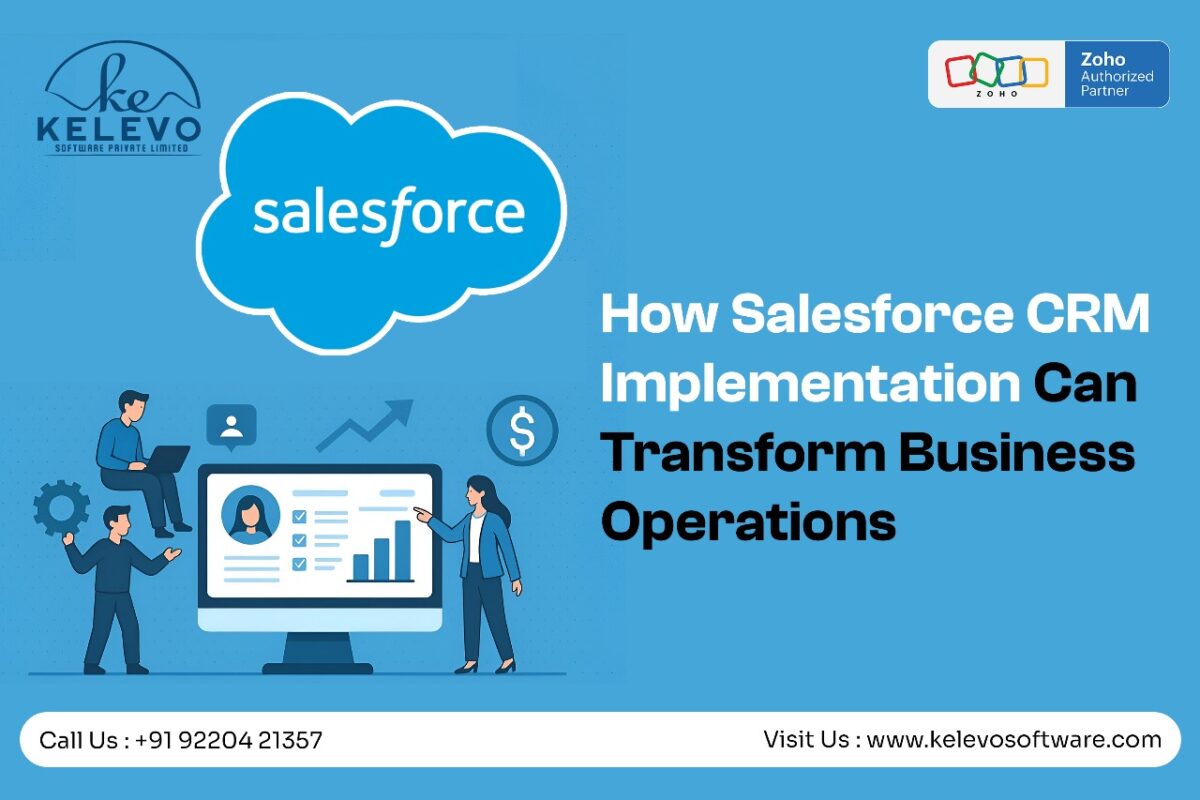In today’s competitive business environment, organizations are constantly looking for ways to streamline workflows, improve customer relationships, and drive sustainable growth. One of the most effective solutions to achieve these goals is Salesforce CRM implementation. Salesforce is more than just a customer relationship management tool, it is a powerful ecosystem designed to transform the way companies operate.
From sales and marketing to customer service and analytics, Salesforce provides the flexibility and scalability that modern businesses need to stay ahead. This blog explores how Salesforce CRM implementation can reshape business operations, the benefits it delivers, and the steps companies should take for a smooth transition.
Understanding Salesforce CRM
At its core, Salesforce CRM (Customer Relationship Management) is a cloud-based platform that allows businesses to manage leads, customers, and interactions in a centralized system. Unlike traditional CRM systems, Salesforce is highly customizable and integrates seamlessly with third-party tools, making it a dynamic solution for organizations of all sizes.
Key features of Salesforce CRM include:
- Sales Cloud – Automates sales processes, manages opportunities, and tracks performance.
- Service Cloud – Enhances customer support through case management, AI-powered chatbots, and knowledge bases.
- Marketing Cloud – Helps teams create personalized campaigns and track customer journeys.
- Analytics & Reporting – Provides actionable insights for decision-making.
With these capabilities, Salesforce CRM implementation goes beyond simple record-keeping—it becomes a strategic driver for operational excellence.
Why Salesforce CRM Implementation Matters
Implementing Salesforce CRM is not just about adopting new software. It’s about transforming the way a business functions. Here are some reasons why Salesforce implementation is crucial:
- Centralized Data Management
Businesses often struggle with scattered customer data across spreadsheets, emails, and different software systems. Salesforce consolidates this data into one platform, ensuring easy access and better collaboration across departments. - Enhanced Customer Experience
A seamless customer experience is vital for retention and loyalty. Salesforce enables businesses to track customer interactions across multiple touchpoints, helping teams respond faster and more effectively. - Automation of Manual Tasks
By automating repetitive processes such as lead nurturing, follow-ups, and reporting, Salesforce frees up employees to focus on higher-value tasks like building relationships and closing deals. - Scalability and Flexibility
Salesforce grows with your business. Whether you are a small startup or a large enterprise, its modular design allows customization as per unique business needs. - Data-Driven Decision Making
With built-in analytics and dashboards, businesses gain real-time insights that guide smarter decisions.
How Salesforce CRM Implementation Transforms Business Operations
- Streamlining Sales Processes
Sales teams benefit the most from Salesforce CRM. Lead management, opportunity tracking, and automated workflows reduce inefficiencies. Sales representatives can access customer history, preferences, and communication records in seconds, improving conversion rates and reducing the sales cycle.
2. Improving Marketing Campaigns
Salesforce Marketing Cloud enables businesses to design targeted campaigns based on customer behavior. Personalized messaging increases engagement, while campaign analytics track ROI. This ensures that marketing investments yield measurable results.
3. Elevating Customer Support
Customer service is no longer limited to phone calls. With Salesforce Service Cloud, businesses can manage cases via email, live chat, or social media. Features like AI-driven chatbots provide 24/7 support, improving satisfaction while reducing response times.
4. Fostering Collaboration Across Teams
With Salesforce’s cloud-based environment, teams can collaborate in real-time, regardless of location. Integration with collaboration tools like Slack or Microsoft Teams further enhances productivity.
5. Strengthening Decision-Making
Executives and managers can access detailed reports and predictive analytics. From forecasting sales performance to identifying bottlenecks, Salesforce helps businesses take proactive measures.
6. Enabling Seamless Integrations
Salesforce integrates with ERP systems, e-commerce platforms, email services, and countless third-party apps. This interconnected ecosystem ensures that all business functions—from accounting to logistics—work in harmony.
Best Practices for Successful Salesforce CRM Implementation
While Salesforce offers immense potential, the success of implementation depends on proper planning and execution. Here are best practices businesses should follow:
- Define Clear Objectives
Identify what you want to achieve—whether it’s boosting sales, improving customer support, or streamlining operations. Clear goals help guide the implementation process. - Involve Stakeholders Early
Engage sales, marketing, service, and IT teams during the planning phase. Their input ensures that the system meets real-world requirements. - Customize Wisely
Salesforce allows extensive customization, but over-customization can lead to complexity. Focus on features that align with your business needs. - Invest in Training
User adoption is critical. Conduct regular training sessions so employees feel confident using the platform. - Leverage Expert Partners
Working with experienced consultants, like Kelevo Software, ensures smooth deployment, migration of existing data, and minimal disruptions to daily operations. - Monitor and Optimize Continuously
Implementation is not a one-time event. Regularly review performance metrics, gather feedback, and fine-tune processes for continuous improvement.
Real-World Impact of Salesforce CRM
Organizations across industries have witnessed significant transformations with Salesforce CRM implementation. For instance:
- Retail companies improve personalized shopping experiences by tracking customer purchase history.
- Healthcare providers streamline patient management with secure, centralized records.
- Financial institutions automate compliance workflows while strengthening client relationships.
- Manufacturing firms gain better visibility into supply chains, ensuring timely deliveries and reduced costs.
These examples highlight Salesforce’s adaptability to diverse industries, making it a universal tool for operational growth.
The Role of Kelevo Software in Salesforce CRM Implementation
At Kelevo Software, we understand that Salesforce CRM implementation is more than technology—it’s a strategy. Our team of certified professionals helps businesses design, deploy, and optimize Salesforce solutions tailored to their unique needs.
We offer:
- End-to-end Salesforce implementation services.
- Seamless integration with existing ERP and business tools.
- Custom app development on the Salesforce platform.
- Training and ongoing support to ensure maximum adoption.
With a proven track record, Kelevo Software empowers businesses to unlock the full potential of Salesforce and achieve long-term growth.

